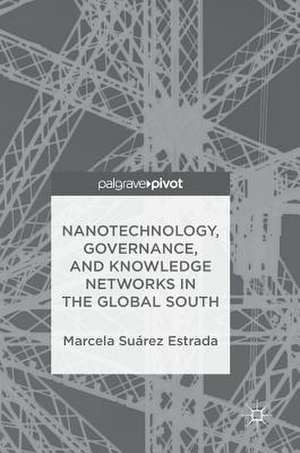Nanotechnology, Governance, and Knowledge Networks in the Global South
Autor Marcela Suárez Estradaen Limba Engleză Hardback – 27 noi 2017
Preț: 384.86 lei
Nou
Puncte Express: 577
Preț estimativ în valută:
73.65€ • 76.46$ • 61.41£
73.65€ • 76.46$ • 61.41£
Carte tipărită la comandă
Livrare economică 22 martie-05 aprilie
Preluare comenzi: 021 569.72.76
Specificații
ISBN-13: 9783319695136
ISBN-10: 3319695134
Pagini: 101
Ilustrații: XIII, 101 p. 2 illus. in color.
Dimensiuni: 148 x 210 mm
Greutate: 0.34 kg
Ediția:1st ed. 2018
Editura: Springer International Publishing
Colecția Palgrave Pivot
Locul publicării:Cham, Switzerland
ISBN-10: 3319695134
Pagini: 101
Ilustrații: XIII, 101 p. 2 illus. in color.
Dimensiuni: 148 x 210 mm
Greutate: 0.34 kg
Ediția:1st ed. 2018
Editura: Springer International Publishing
Colecția Palgrave Pivot
Locul publicării:Cham, Switzerland
Cuprins
1. Introduction: "The Power of Small".- 2. Assembling Power, Agencies, and Governance in Nanotechnology Networks.- 3. Imagining a Better Future for Mexico through Nanodiscourses.- 4. Liking Governance, Agencies, and Knowledge Networks at CIMAV.- 5. CIMAV and the Weaving of Transnational Knowledge Networks.- 6.Conclusion.
Notă biografică
Marcela Suárez Estrada is a research fellow and lecturer at the Lateinamerika-Institut at Freie Universität Berlin, Germany.
Textul de pe ultima copertă
The seemingly unlimited technological potential of nanotechnology brings with it new practices of governance, networking, and exercising power and agency. Focusing on scholars in the Global South, this text covers nanotechnology discourses, imaginaries, and materialities as they circulate and interact within governance knowledge networks. Rather than adapt their actions to existing governance mechanisms and science, technology, and innovation policy, researchers use the imaginary of nanotechnology to create new symbolic and material incentives, thus shaping its governance. By tracing the constantly shifting asymmetries of knowledge and power, the book offers fresh insights into the dynamics of knowledge networks.
Caracteristici
Attempts to go beyond taking a neutral focus on knowledge networks by proposing a new perspective to analyze them as being dynamic Highlights the agency and dynamic capacity of non-state actors and the ways in which they affect networks Analyzes the different sources of power shaping nanotechnology, reveals the tensions and asymmetries in transnational nanotechnology networks, and presents evidence of shifting power in nanotechnology networks
